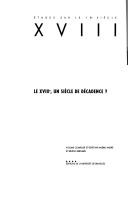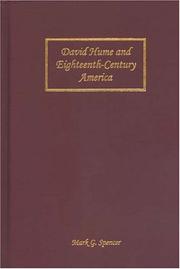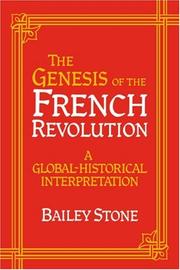| Listing 1 - 10 of 22 | << page >> |
Sort by
|
Digital
Year: 1778 Publisher: London Printed for Fielding and Walker
Abstract | Keywords | Export | Availability | Bookmark
 Loading...
Loading...Choose an application
- Reference Manager
- EndNote
- RefWorks (Direct export to RefWorks)
Digital
Abstract | Keywords | Export | Availability | Bookmark
 Loading...
Loading...Choose an application
- Reference Manager
- EndNote
- RefWorks (Direct export to RefWorks)

ISSN: 07721358 ISBN: 2800413832 9782800413839 Year: 2006 Volume: 34 Publisher: Bruxelles Éditions de l'Université de Bruxelles
Abstract | Keywords | Export | Availability | Bookmark
 Loading...
Loading...Choose an application
- Reference Manager
- EndNote
- RefWorks (Direct export to RefWorks)
ans doute peu de lecteurs du XXIe siècle répondraient-ils positivement à la question posée en tête de ce volume. Et le fait même de la formuler pourra paraître incongru à certains. Ce serait ignorer, cependant, qu'en plein siècle des Lumières, de nombreuses voix se sont élevées afin de mettre en doute les progrès dont on se targuait généralement dans les différents domaines de la connaissance, des arts, ou de la littérature. Et ces voix n'émanaient pas que des anti-Philosophes, loin de là ! Dans le camp philosophique lui-même, en effet, les plus grands auteurs - Rousseau, bien sûr, mais aussi Voltaire ou Montesquieu, par exemple - n'ont pas manqué de comparer défavorablement leur propre époque aux précédentes, jugées plus fastes, plus sages, ou comme ayant fait preuve d'un goût plus sûr. L'Antiquité, cela va sans dire, se taille la part du lion dans ces flatteuses appréciations, mais aussi, notamment, un XVIIe siècle que l'éclat du Roi-Soleil nimbe encore d'un énorme prestige. Tour à tour, tous les domaines de la vie sociale sont passés au crible par les censeurs des turpitudes du siècle : décadence des murs et de l'art de gouverner, laxisme des couvents, recul de la musique religieuse « inspirée » devant un art désormais voué au seul plaisir, vogue dangereuse du « trop facile » roman, utopies aventureuses menaçant l'ordre social, etc. Face à ce constat plutôt inquiétant, nombreux sont les auteurs qui finissent par se résigner à imputer aux "lois de l'histoire", ou même parfois à celles de l'évolution de l'espèce humaine, cette "décadence" somme toute inévitable puisqu'elle se trouve en germe dans tous les apogées. On se convainc par conséquent, en lisant ce volume, que derrière le masque optimiste des Lumières et le rêve qu'elles portent d'un avenir meilleur, les hommes du dix-huitième siècle pressentaient avec acuité, mais non sans trouble, l'approche d'une impasse sociétale qui allait bientôt conduire aux bouleversements que l'on sait. Entre nostalgie d'un passé déjà révolu et anticipations audacieuses d'un futur encore espéré, la tension était manifestement devenue trop forte. A l'appel du Groupe d'étude du XVIIIe siècle de l'Université libre de Bruxelles, une quinzaine de chercheurs belges, français et italiens se sont penchés sur ce thème, sans doute trop peu étudié jusqu'à présent.
History of civilization --- anno 1700-1799 --- Regression (Civilization) --- Eighteenth century --- Décadence --- Dix-huitième siècle --- France --- Civilization --- Civilisation --- DNHISTO DNU-EUB EPUB-ALPHA-X EPUB-DNU-FT EPUB-LIV-FT LIVHISTO EDITIONSULB-B --- Civilization, Modern --- Eighteenth century. --- Europe --- Intellectual life --- Décadence --- Littérature --- Dans la littérature. --- Thèmes, motifs. --- Geschiedenis van de nieuwe tijden --- Histoire des civilisations --- Europa ; geschiedenis van de nieuwe tijden

ISBN: 1580461182 1580463444 9786611741242 1281741248 1580466338 9781580466332 Year: 2005 Publisher: Rochester, N.Y. University of Rochester Press
Abstract | Keywords | Export | Availability | Bookmark
 Loading...
Loading...Choose an application
- Reference Manager
- EndNote
- RefWorks (Direct export to RefWorks)
A thorough examination of the role which David Hume's writings played upon the founders of the United States. This book explores the reception of David Hume's political thought in eighteenth-century America. It presents a challenge to standard interpretations that assume Hume's thought had little influence in early America. Eighteenth-century Americans are often supposed to have ignored Hume's philosophical writings and to have rejected entirely Hume's 'Tory' 'History of England'. James Madison, if he used Hume's ideas in 'Federalist' No. 10, it is commonly argued, thought best to do so silently-open allegiance to Hume was a liability. Despite renewed debate about the impact of Hume's political ideas in America, existing scholarship is often narrow and highly speculative. Were Hume's works available in eighteenth-century America? If so, which works? Where? When? Who read Hume? To what avail? To answer questions of that sort, this books draws upon a wide assortment of evidence. Early American book catalogues, periodical publications, and the writings of lesser-light thinkers are used to describe Hume's impact on the social history of ideas, an essential context for understanding Hume's influence on many of the classic texts of early American political thought. Hume's 'Essays and Treatises on Several Subjects', was readily available, earlier, and more widely, than scholars have supposed. The 'History of England' was read most frequently of all, however, and often in distinctive ways. Hume's 'History', which presented the British constitution as a patch-work product of chance historical developments, informed the origins of the American Revolution and Hume's subsequent reception through the late eighteenth century. The 326 subscribers to the first American edition of Hume's 'History' (published in Philadelphia in 1795/96) are more representative of the 'History's' friendly reception in enlightened America than are its few critics. Thomas Jefferson's latter-day rejection of Hume's political thought foreshadowed Hume's falling reputation in nineteenth-century America.MARK G. SPENCER is associate professor of history at Brock University where he holds a Chancellor's Chair for Research Excellence. His books include Hume's Reception in Early America (2002), Utilitarians and Their Critics in America, 1789-1914 (2005), and Ulster Presbyterians in the Atlantic World (2006).
Hume, David --- Political science --- History --- Hume, David, --- America. --- American Revolution. --- David Hume. --- Early America. --- Early American Political Thought. --- Eighteenth Century. --- Enlightenment. --- Impact of Hume's Works. --- Influence. --- Mark G. Spencer. --- Political Ideas. --- Political Thought.
Multi
ISBN: 9783030976224 9783030976217 9783030976231 9783030976248 Year: 2022 Publisher: Cham : Springer International Publishing : Imprint: Palgrave Macmillan,
Abstract | Keywords | Export | Availability | Bookmark
 Loading...
Loading...Choose an application
- Reference Manager
- EndNote
- RefWorks (Direct export to RefWorks)
David Bowie and Romanticism evaluates Bowie’s music, film, drama, and personae alongside eighteenth- and nineteenth-century poets, novelists, and artists. These chapters expand our understanding of both the literature studied as well as Bowie’s music, exploring the boundaries of reason and imagination, and of identity, gender, and genre. This collection uses the conceptual apparata and historical insights provided by the study of Romanticism to provide insight into identity formation, drawing from Romantic theories of self to understand Bowie’s oeuvre and periods of his career. The chapters discuss key themes in Bowie’s work and analyze what Bowie has to teach us about Romantic art and literature as well.
Music --- Theatrical science --- Literature --- performances (kunst) --- theater --- literatuur --- muziek --- anno 1700-1799 --- anno 1800-1899 --- anno 1900-1999 --- Literature, Modern --- Music. --- Performing arts. --- Theater. --- Nineteenth-Century Literature. --- Eighteenth-Century Literature. --- Theatre and Performance Arts. --- 19th century. --- 18th century.
Multi
ISBN: 9783030988531 9783030988524 9783030988548 9783030988555 Year: 2022 Publisher: Cham : Springer International Publishing : Imprint: Palgrave Macmillan,
Abstract | Keywords | Export | Availability | Bookmark
 Loading...
Loading...Choose an application
- Reference Manager
- EndNote
- RefWorks (Direct export to RefWorks)
“Robertson guides us to a deeper understanding of Swift's intention in writing his tale of Gulliver’s fantastical voyages. We discover an exploration of the permanent questions that characterize human life and define our contemporary dilemma, including: what constitutes knowledge, and how can we ensure it is directed toward the human good? We gain fresh tools to investigate such questions with Robertson as our skillful guide.” —Patrick Malcolmson, Professor Emeritus, Department of Political Science, St. Thomas University, Canada “This book is a much needed re-discovery of Swift. We can all gain from Robertson’s study a new appreciation of Swift's greatness as a thinker in addition to a literary giant and, of course, a satirist.” —Colin D. Pearce, Lyceum Professor, Lyceum Program, Clemson Institute for the Study of Capitalism, USA This book analyzes Jonathan Swift’s Gulliver’s Travels from a political philosophy perspective. When authors have focused on politics in Swift’s writings, this has usually meant a study of how Swift located himself on issues of his day such as church and state, and Ireland. Robertson claims by contrast that Gulliver’s Travels is fundamentally a book about the “ancients” (e.g. Plato, Aristotle), and the “moderns” (science and technology), and their contrasting views about the human condition. The claim that the Travels is “a kind of prolegomena” to political philosophy leaves open the possibility that it does not achieve, or seek to achieve, a fusion of various teachings but rather uses the device of alien societies to point us to uncomfortable aspects of political philosophy’s “larger questions” we are prone to ignore. Swift, Robertson argues, draws our attention to some version of the classical republic, as idealized in Aristotle’s political writings and in Plato’s Republic, as opposed to a modern regime which, at its best or most intellectual, emphasizes modern science and technology in combination as a way to improve the human condition. Lloyd W. Robertson is a former lecturer in political science at St. Thomas University in Canada, among other post-secondary institutions.
Political philosophy. Social philosophy --- Politics --- Literature --- literatuur --- politiek --- politieke filosofie --- literatuurgeschiedenis --- anno 1700-1799 --- Political science. --- Political science --- Literature, Modern --- Political Theory. --- Political Philosophy. --- Literary Criticism. --- Eighteenth-Century Literature. --- Philosophy. --- History and criticism. --- 18th century.
Multi
ISBN: 0521372739 0521075130 0511896220 9780511896224 9780521372732 9780521075138 Year: 1989 Publisher: Cambridge Cambridge University Press
Abstract | Keywords | Export | Availability | Bookmark
 Loading...
Loading...Choose an application
- Reference Manager
- EndNote
- RefWorks (Direct export to RefWorks)
The author of Tristram Shandy made frequent use of literary fragments from other writers, as part of his own style. Laurence Sterne's quotations, plagiarisms and allusions were often employed in the service of the pleonasm, or 'performed pun'. Jonathan Lamb describes Sterne's operation of the pleonasm as his 'double principle'. He sees this style not as the key to some clever puzzle whose clues we go on solving in the hope of total disclosure of meaning (as some critics have claimed); rather the opposite, that it is a consoling reminder that neither we nor the text can ever be complete. Lamb severs Sterne from the Locke tradition and frees him from the 'influence' oriented studies which have aimed to authenticate him through his borrowings. This allows us to read him as a writer eagerly exploring the turns and paradoxes of associationist thought and adapting the rhetoric of the sublime to the stutterings of ordinary speech.
Sterne, Laurence --- Arts and Humanities --- Literature --- Experimental fiction, English --- Civilization, Modern --- Doubles in literature. --- History and criticism. --- Sterne, Laurence, --- Criticism and interpretation. --- Doppelgänger in literature --- Doppelgängers in literature --- Split self in literature --- Eighteenth century --- Stʻērn, Lawrēns, --- Yorick, --- Stern, Lourens, --- Stern, Lorens, --- Стерн, Лоренс, --- Στερν, Λωρενς, --- Iorik, --- Sterne, --- Sŭtʻŏn, Lorensŭ,

ISBN: 0521445566 0521445701 1139174150 9781139174152 9780521445566 9780521445702 Year: 1994 Publisher: Cambridge New York ; Melbourne Cambridge University Press
Abstract | Keywords | Export | Availability | Bookmark
 Loading...
Loading...Choose an application
- Reference Manager
- EndNote
- RefWorks (Direct export to RefWorks)
The Genesis of the French Revolution, first published in 1994, offers an interesting synthesis of the long- and short-term causes of the French Revolution. Instead of focusing exclusively upon developments within France, the book immediately places the country, and its revolution, within an international setting. Bailey Stone argues that the French Revolution stemmed from the pre-revolutionary state's converging failures in international and domestic affairs; the monarchy failed not only to remain in touch with changing social, intellectual, and political realities at home, but also to harness its citizens' ambitions and talents to the purpose of maintaining the country's international power and prestige. This analysis also provides a key to comprehending the course of events in revolutionary and post-revolutionary France - and an insight into why revolutionary movements broke out in the former USSR and its surrounding countries.
History of France --- anno 1700-1799 --- Enlightenment --- World politics --- Siècle des lumières --- Politique mondiale --- France --- History --- Causes --- Influence --- Histoire --- Siècle des lumières --- Aufklärung --- Eighteenth century --- Philosophy, Modern --- Rationalism --- Causes. --- Influence. --- Revolution, 1789-1799 --- France - History - Revolution, 1789-1799 - Causes. --- France - History - Revolution, 1789-1799 - Influence. --- Arts and Humanities --- Enlightenment.
Multi
ISBN: 9781107681408 9781107021198 9781139108645 9781139377560 1139377566 1107021197 1139108646 9781139380423 1139380427 9786613633750 6613633755 9781139376136 9781280647703 1280647701 1139366408 1107231469 1139378996 1139376136 1139372149 1107681405 9781139366403 9781107231467 9781139378994 9781139372145 Year: 2012 Publisher: New York : Cambridge University Press,
Abstract | Keywords | Export | Availability | Bookmark
 Loading...
Loading...Choose an application
- Reference Manager
- EndNote
- RefWorks (Direct export to RefWorks)
Physiocrats believed that wealth came exclusively from the land, that nature was fecund and man could harness its reproductive forces. Capital investments in agriculture and hard work would create profits that circulated to other sectors and supported all social institutions. Physiocracy, which originated in late eighteenth-century France, is therefore widely considered a forerunner of modern economic theory. This book places the Physiocrats in context by inscribing economic theory within broader Enlightenment culture. Liana Vardi discusses three theorists - Francois Quesnay; Victor Riquetti, marquis de Mirabeau; and Pierre Samuel Du Pont de Nemours - and shows how their understanding of mental processes, science, politics and the arts influenced their individual approach to economic writing. The difficulty in explaining the doctrine, combined with the expectation that the public would be persuaded by its arguments, mired physiocracy in endless contradictions. This work offers a framework for understanding physiocratic theory and its complicated relation to modern economics.
Physiocrats. --- HISTORY / Europe / General. --- Economic schools --- Economics --- Enlightenment --- Physiocrats --- Bodenreform --- Economists --- Aufklärung --- Eighteenth century --- Philosophy, Modern --- Rationalism --- Economic theory --- Political economy --- Social sciences --- Economic man --- Economics. --- Enlightenment. --- E-books --- Arts and Humanities --- History --- Mouvement des lumières --- Physiocrates --- Mouvement des lumières
Multi
ISBN: 9781580465779 9781782049227 1782049223 Year: 2017 Publisher: Rochester University of Rochester Press
Abstract | Keywords | Export | Availability | Bookmark
 Loading...
Loading...Choose an application
- Reference Manager
- EndNote
- RefWorks (Direct export to RefWorks)
The successful sale and distribution of music has always depended on a physical and social infrastructure. Though the existence of that infrastructure may be clear, its organization and participants are among the least preserved and thus least understood elements of historical musical culture. Who bought music and how did those consumers know what music was available? Where was it sold and by whom? How did the consumption of music affect its composition? How was consumers' musical taste shaped and by whom? Focusing on the long eighteenth century, this collection of nine essays investigates such questions from a variety of perspectives, each informed by parallels between the consumption of music and that of dance, visual art, literature, and philosophy in France, the Austro-German lands, and the United States. Chapters relate the activities of composers, performers, patrons, publishers, theorists, impresarios, and critics, exploring consumers' tastes, publishers' promotional strategies, celebrity culture, and the wider communities that were fundamental to these and many more aspects of musical culture. CONTRIBUTORS: Glenda Goodman; Roger Mathew Grant; Emily H. Green; Marie Sumner Lott; Catherine Mayes; Peter Mondelli, Rupert Ridgewell, Patrick Wood Uribe, Steven Zohn Emily H. Green is assistant professor of music at George Mason University. Catherine Mayes is assistant professor of musicology at the University of Utah.
Music publishing --- Music --- History --- Social aspects --- Economic aspects --- muziekgeschiedenis --- anno 1700-1799 --- anno 1800-1899 --- art history. --- buying music. --- econoic trends. --- economy in music. --- eighteenth century. --- music composition. --- music history. --- music theory. --- musicians. --- musicology. --- seventeen hundreds. --- social theory of music. --- social trends. --- sociology. --- study of music.
| Listing 1 - 10 of 22 | << page >> |
Sort by
|

 Search
Search Feedback
Feedback About UniCat
About UniCat  Help
Help News
News